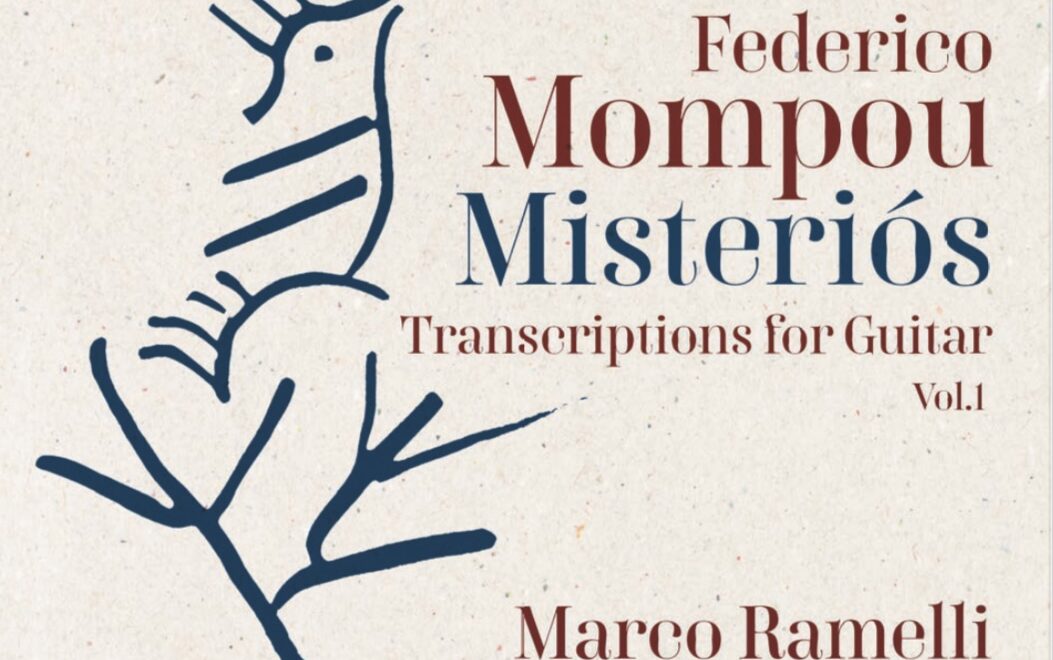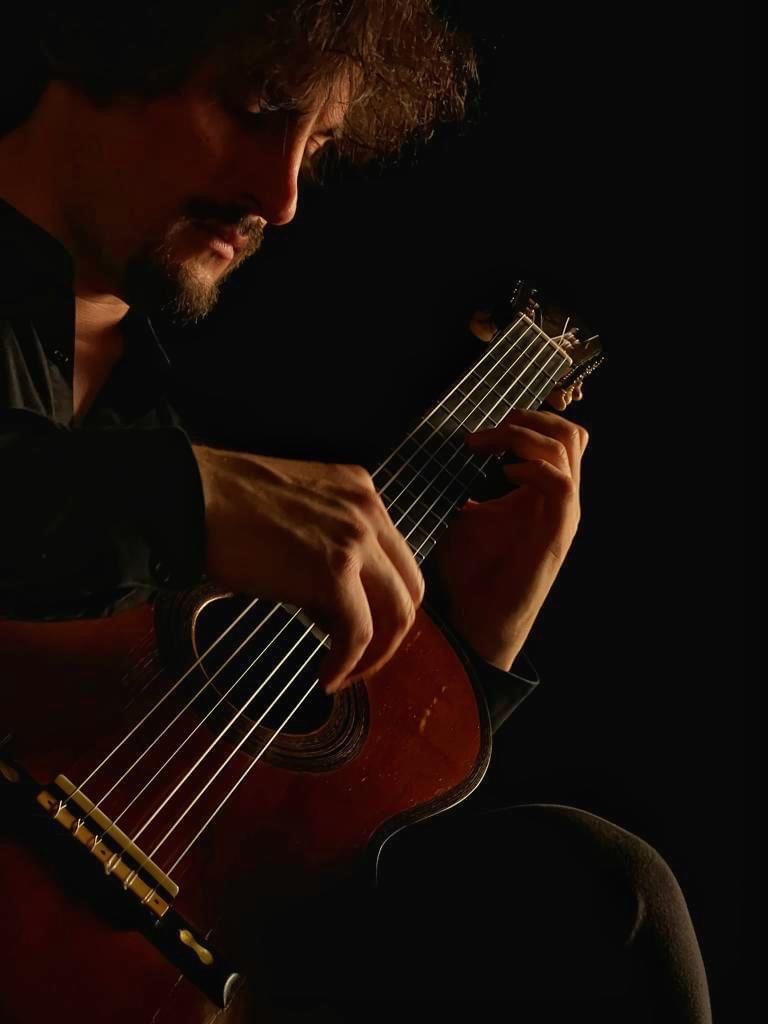Mompou: Misteriós, Transcriptions for Guitar, Vol.1
Marco Ramelli
The music is written for the inexpressible, I wish it seemed that it comes out of the shadows to return back into it.
Federico Mompou
This album is dedicated to the compositions of Federico Mompou i Dencausse, a composer and pianist of profound sensitivity. Born on April 16, 1893, in Barcelona, Mompou exhibited an early inclination for the piano. However, his artistic journey took a critical turn in 1909, inspired by a Gabriel Fauré concert. Shifting his focus to composition, he embarked on a trajectory akin to many artists of his era, finding his way to Paris to further his study. Upon returning to his homeland, he continued his profoundly personal approach to the piano, exploring its most poetic facets as a composer and interpreter. Despite his innate introversion, the unique voice of his music soon gained recognition. His contemplative and poetic music is a mirror to his life, one of introspection, in which music was used as a medium to connect to his spiritual world.
Mompou’s compositional approach was rooted in the trust of intuition and inspiration, channeled through the piano, which he considered fundamental in connecting with music’s essence. This symbiotic relationship with the piano during his creative process led him to compose primarily on and for the instrument. However, there are some exceptions, most notably his compositions for the guitar: Suite Compostelana (1962) and Cançon i Dansa No 13 (1972).
In the guitar’s melancholic and evocative timbre, Mompou discovered an ideal medium to express his contemplative and gentle poetic world. The guitar becomes the canvas where sound and silence intertwine, evoking emotions capable of transporting the listener to archaic places suspended in time.
In 2018, Brilliant Classics released my recording of Mompou’s original guitar compositions. This new album further continues this exploration of the composer’s works, taking his piano compositions and reimagining them for the guitar. My heartfelt gratitude first goes to James Beneteau, who, years ago, presented me with his exquisite transcriptions of Mompou’s pieces. Since then, our collaboration has been profound, transcribing Mompou’s music not solely to fit within the confines of the guitar’s six strings, but to perceive it through an alternative lens. I perceive Mompou’s music from a realm beyond time and space, it is music that can be experienced without the need for understanding, a pure form of sonic expression that transcends the boundaries of knowledge. Therefore, this note does not aim to ‘dissect’ or to ‘explain’ the recorded music. Instead, I would like to offer some insights into Mompou’s poetic essence, as conveyed through his writings and interpretations, exploring how it relates to the nature of this recording.
Mompou’s poetic, spiritual connection and music are intertwined through his intimate relationship with sound. Mompou never perceived himself as a composer. He used physical contact with his instrument and sound as the conduits for composing music through inspiration. Thus, Mompou’s music thrives on a unique form of listening inspired by Eastern and mystical cultures that may be better described as ‘feeling.’ It is an active engagement that guides the composer into a world where music is born by inspiration through the contact of resonance and vibration. Music that is not composed, but received.
Central to Mompou’s philosophy was the notion that the piano was the medium bridging him to the realm of the spiritual. He possessed a heightened sensitivity and, through contact with the instrument, created a bridge between the ethereal and the tangible. In particular, he focused his listening on the space between two notes. Mompou’s unique essence is encapsulated in this region of the ‘between,’ where the very essence of one note is transferred to another.
In his music and interpretations, everything responds to the perception of the sound between two notes and sensing the instrument’s sound production process. In this artistic philosophy, Mompou’s written score becomes a map for reliving his listening/playing experience through interpretation. Time and rhythm symmetry bow to the act of listening, becoming fluid entities that serve the demands of the sound. The written compositions are not definitive, they evolve through interaction with sound and silence and the instrument vibration, and Mompou’s own recordings are testimony of that.
Transcribing and interpreting Mompou’s compositions has set me on a transformative path, profoundly influencing my approach to sound and music. Indeed, it has urged me to rethink my vision of the guitar. The guitar’s beauty and mystery lie in the sound’s decay, that is, the space between the notes. Mompou’s compositions demand us to embrace the silence amidst the notes—an active silence where both instrument and player continue their relationship through vibration.
Throughout our transcription journey, we followed Mompou’s scores as a map, transmuting each piece through the lens of contact with the geography of the guitar’s unique resonance. Decisions about transcription, instrumental technique, tempo, and dynamics are all intertwined with this listening to the instrument itself. Playing Mompou’s music transcribed for guitar is a journey aimed at heightened listening and sensitivity, exploring the spaces between notes through tactile contact with the instrument. This recording captures this creative process and marks the beginning of this ongoing artistic journey.
From the moment the first vibration began in dark empty space, until the moment we assume that immobility will return to the darkness: are this beginning and this end, this life and death the limits of eternity?
If nature teaches us that everything rebegins, it may also be believed that this beginning and end, this eternity assumed by our poor imagination, is only a period of eternity.
Federico Mompou
Marco Ramelli
Price: 10 € + shipment fee

Info CD
I want to extend my heartfelt gratitude to Gabriele Lodi, the luthier behind the guitar named
‘La Macchiata,’ a resonant companion that enriched these recordings. ‘La Macchiata’ is characterized
by its extreme lightweight construction. The idea behind the guitar, created for this project, explores the concept of fragility and delicacy transforming them from a limitation into a potent tool for musicians
to explore its nuanced subtleties. Gabriele created an instrument of mystical exploration.
Lastly, I would like to express my gratitude to Chandra Candiani. Her poetry and her book Il silenzio è cosa viva, have accompanied and influenced my exploration of Mompou’s music.
Recording: 13-14 July 2022, Collegio Rotondi, Gorla Minore, Italy Sound Engineer: Alessandro Scandroglio
Guitar: Gabriele Lodi ‘La macchiata’
Artist photo: C Marco Ramelli
Cover: Drawing of a Bird (date unknown) by Federico Mompou P & C 2024 Brilliant Classics

